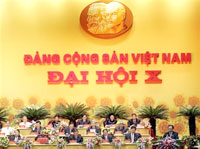




HANOI—Vietnam’s Communist Party has voted its top leader in for another term in office, to continue the country’s current economic reform program amid growing concerns over official corruption.
Party General Secretary Nong Duc Manh, who pledged to keep up the fight against corruption while maintaining market-oriented economic reforms that have transformed the country into Southeast Asia's fastest growing economy, retained his position as first among equals in the ruling triumvirate that includes the president and prime minister.
Key posts were expected see a shake-up, with Prime Minister Phan Van Khai, 72, and President Tran Duc Luong, 68, widely expected to step down to make way for younger leaders.
Manh, 65, said he would dedicate himself to eradicating the "negative phenomenon" of corruption within the Communist Party and government.
"We cannot solve this overnight but we do see the problem. We will not let wrongdoers escape," he told reporters. "Once we uncover the corruption, we must punish them severely."
The Communist Party is to make its recommendation for the top two government posts to the National Assembly, which is to formally confirm the choices during a legislative session, either next month or in the latter part of the year.
Manh, an ethnic minority Tay from northern Bac Kan province, and a Soviet-trained forestry engineer who spent a decade as chairman of the National Assembly before winning the top post in 2001, also vowed that Vietnam would continue its economic reform program "in a stronger, more comprehensive manner and develop with a faster and sustainable pace."
The eight-day 10th Party Congress, running from April 18-25, is tasked with electing the party's leadership board for the next term of office, defining orientations for the country's socioeconomic development from 2006-2010, and adopting the party's amended statute.
The Party was rocked by a multi-million dollar bribery and football betting scandal in the months leading up to the five-yearly Congress that led to the resignation of the transport minister and arrest of his deputy on April 4.
Ho Chi Minh-based journalist and political commentator Nguyen Quoc Thai said laborious hierarchical procedures made any form of action against growing official corruption extremely difficult.
"I think that the structure has so many loopholes that have brought about serious scandals involving corruption, kickbacks, or bribery," Thai told RFA's Vietnamese service.
"At the same time, there exist in the structure barriers that have prevented effective action and allowed serious oversights of wrongdoing...For instance, the Prime Minister cannot take firm measures against such high-ranking officials as a minister or vice minister, without first garnering his superiors’ opinions," he said.
Thai said the forces of conservatism existed within any regime, even the most open and politically developed.
"They exist in any shape or form; they sophisticatedly hide themselves under certain labels. However, given the ideas expressed and scandals exposed in the press, as well as the suggestions submitted to the government and the Party, these conservative forces have got to retreat, even tactically," he said.
The Party, one of the few ruling communist governments, has been in power since the fall of U.S.-backed South Vietnam in 1975. It has 3.1 million members.
Original reporting by RFA’s Vietnamese service. Written and produced for the Web in English by Luisetta Mudie. Edited by Sarah Jackson-Han.